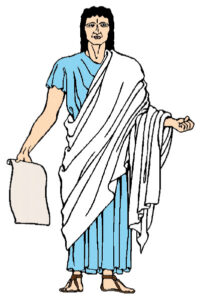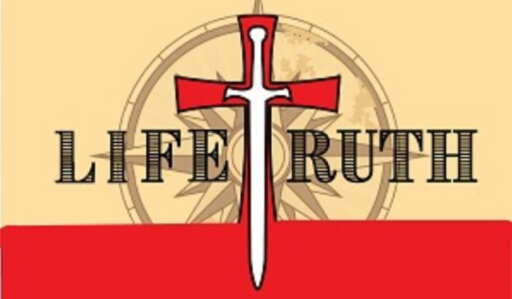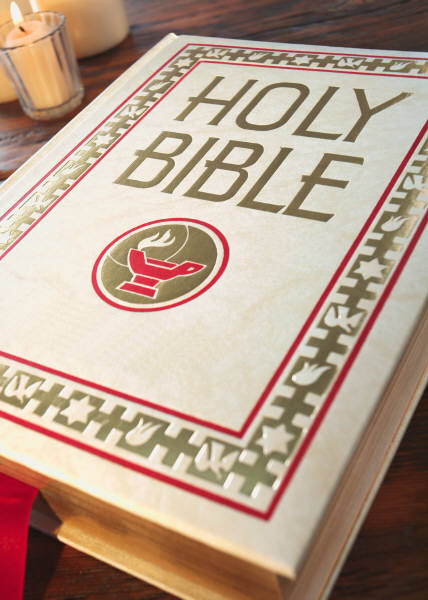In response to the statement that the King James Authorized version of 1611 is the only one Christians should use, Keith dives into how we came to have the bible in the English language. It took centuries to compile and canonize, by inspired and faithful men before King James came on the scene.

The law was completed by Moses around 1450 BC, with the events of Job taking place roughly during Abraham’s life. Deuteronomy 4:44 And this is the law which Moses set before the children of Israel:
Leaders and future kings were to study the law. Deuteronomy 17:19 And it shall be with him, and he shall read therein all the days of his life: that he may learn to fear the LORD his God, to keep all the words of this law and these statutes, to do them:
The words were more than governmental laws, they were the inspired words of God that all people in the nation were to obey.
Deuteronomy 27:26 Cursed be he that confirmeth, not all the words of this law to do them. And all the people shall say, Amen.
Deuteronomy 28:58-62
58 If thou wilt not observe to do all the words of this law that are written in this book, that thou mayest fear this glorious and fearful name, THE LORD THY GOD;
59 Then the LORD will make thy plagues wonderful, and the plagues of thy seed, even great plagues, and of long continuance, and sore sicknesses, and long continuance.
60 Moreover he will bring upon thee all the diseases of Egypt, which thou wast afraid of; and they shall cleave unto thee.
61 Also every sickness, and every plague, which is not written in the book of this law, them will the LORD bring upon thee until thou be destroyed.
Deuteronomy 32:46 And he said unto them, Set your hearts unto all the words which I testify among you this day, which ye shall command your children to observe to do, all the words of this

The books of Moses were scripture. Other writings appeared. Joshua was written near the time of his death. Samuel at around the time of Elijah. Josiah purifies the temple and finds the book of the law around620 BC. If the writings of Joshua or Samuel were present, they would be considered prophets, but not necessarily law.
From around 550 to 580 BC, the exile took place, and the books of Jeremiah, Lamentation, and Kings were written. The book of Esther was written by the time Ezra led the exiles out of captivity around 460 BC. Shortly, the books of Chronicles and Ezra were written. Nehemiah was written near the time of the events he describes around 430 BC.
By 250 BC, all the Old Testament books as we know them had been written. The books of the law were translated to Greek and became the Septuagint. Books that were not the law were canonized, but not always considered scripture. They were prophets or other writings. By the time the Septuagint was complete in 150 BC, the 39 books we recognize as scripture were pretty much considered authoritative.
Books known as apocryphal were written during the time of the final days of the prophets, around 400 BC, through the time of Jesus.
Their authority as scripture was highly doubted, butt accepted as important history.

Just about all the New Testament books were written by 70 AD. The exception being John’s writings, around 90 AD or so. Early churches were led by elders, not bishops. By 170 AD, all the elders at the various churches independently managed to gather a collection of writings that were very similar. The collections contain the writings we know as the New Testament.
Fast-forwarding a little, with Greek losing ground as the common language, Jerome translates the original language texts into Latin. More time goes by. Middle English takes over, pushing Old English out of the scene. There’s a demand to have God’s word in the native tongue. The official word from the church is that only Latin can be used. A priest might be allowed to translate on the fly, but writing it down was forbidden on the pain of death.
In 1380, Wycliff begins translating the entire bible from the Latin Vulgate to Middle English. Work done in handwriting since the printing press is yet to be invented. Wycliff isn’t counted in the list of English translations, since his work was done in Middle English, not modern, Elizabethan English
The KJV is not the first to translate the entire bible. Tyndale translated the New Testament in 1525 drawing heavily on Greek, and with the work of Thomas Matthew’s translation of the Old Testament, it became known as the Coverdale Bible.
The KJV is not the first authorized bible. At first King Henry VIII was against the Coverdale bible, but after he split from the Roman Catholic church to start the Church of England, he commissioned Thomas Matthew to update the Coverdale to become authorized as the Great Bible.
Around 1560, reformers fled to Geneva Switzerland, when Mary took over as queen and restored the Roman church. While reformers and scholars had translated original texts, including study notes and references. They also updated the print to use Roman letters, instead of the German-style Gothic letters used in previous versions and most other literature. Queen Mary hated it, considered it a protestant bible, and had her translators rework the Great bible to become the bishop’s bible. It was authorized for church use.
With time running out for this episode, Keith abruptly cuts off the presentation here… right when we were just getting to the KJV. Don’t worry, there’s still lots of drama and competition among bible translations, even at this early stage in the game with English translations. The background information on how scripture came to band has been preserved through time should help to assure the reader that it is a reliable collection, truthful, and closely scrutinized book.
Stay tuned as we get more into the facets that pushed the KJV to the top of the heap, and what makes it the gold standard.
![]()
Credits
consider supporting the podcast through our Patreon page.
feel free to drop us an email, use the comments on the show note page, or call our voicemail at (401)753-4844.
Follow us on social media, and join us in what we’re doing there.
Twitter: @HPNCast
Facebook Page: @LifeTruthPage
Facebook Group: HPNCast Community

Through the Bible Ministries (ttb.org)
Scriptures in the show notes and episode are quoted from the King James Version, except when read by Keith, then it’s the ESV or NASB.
Scripture quotations are from The ESV® Bible (The Holy Bible, English Standard Version®), copyright © 2001 by Crossway, a publishing ministry of Good News Publishers. Used by permission. All rights reserved.”
“Scripture is taken from the NEW AMERICAN STANDARD BIBLE®,
Copyright © 1960,1962,1963,1968,1971,1972,1973,1975,1977,1995
by The Lockman Foundation. Used by permission.”
🡪
Podcast: Play in new window | Download (Duration: 41:43 — 38.2MB)
Subscribe: Apple Podcasts | Amazon Music | Podchaser | RSS | More

